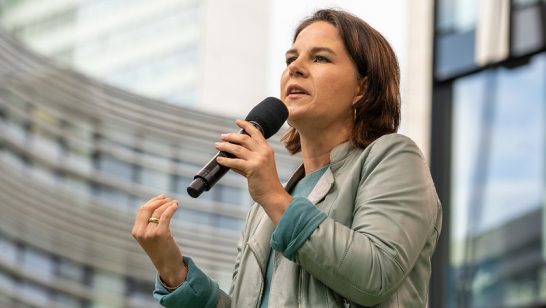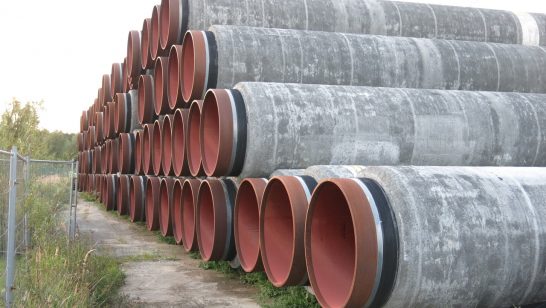
After the painful experience of more than 170 days of coalition talks in 2017-18, many observers would have expected the latest talks to take slightly more time – especially as they involved three prospective coalition partners. Surprisingly, the negotiations between the Social Democrats (SPD), the Green Party and the Liberal Democrats (FDP) took only 60 days: on the 24th of November, the parties presented the coalition agreement. The agreement’s defence and security policy disabuses sceptics of the notion that the SPD and Green Party would not be able to formulate a sensible, transatlantic vision for Germany’s future defence and security policy.
During the election campaign, defence and security policy played a subordinate role – to the extent that one could argue it was consciously treated as a blind spot. Each of the parties (and even more so, the Chancellor candidates) shied away from publicly touching upon controversial issues such as Russia, NATO’s 2% goal, and Germany’s future role in NATO and future commitment as a nuclear host country. Behind the scenes, the Green Party in particular invested a lot of effort into trying to better understand the debate around Germany’s nuclear role: what this role means for NATO in general and NATO’s Eastern European partners in particular; what would be the conditions under which Germany would end nuclear sharing; what would be the price to pay in terms of Alliance cohesion and Berlin’s influence on NATO’s nuclear planning processes; and whether such a unilateral step would in any way improve West-Russia relations.
The Green Party was treated as not only a possible, but the most likely, coalition partner of the CDU/CSU before the elections. As the Christian Democrats are probably the only remaining “real” supporters of the nuclear sharing concept, the defence experts in the Green Party’s circles have prepared themselves for a situation where they would have to make compromises very early on. This does not mean that they are putting their disarmament agenda aside; it was rather a pragmatic decision for a party that only entered the Bundestag for the first time some four decades ago and has since experienced a slow but constant rise in voter approval, but has not been in government since 2005. While not everyone in the Green Party appreciated this pragmatism, what the Green Party did well – also in the coalition talks – was the discretion with which they treated their internal disputes on security and defence issues, which apart from one occasion did not reach the public.
This discretion is exemplified by the way they drafted their election platform. It took the Green Party more time than others to release the final version on their website. Discretely, passages were removed, amended, or rewritten in the draft version which was available and regularly updated on their website. For example, there was at one stage a passage that stated the Green Party would not support any decision on the replacement of the Luftwaffe’s ageing Tornado fighter jet fleet, including its dual-capable aircraft (DCA) – but after just a couple of days, it was removed. In the past, a number of Green politicians have publicly opted against DCA modernisation, leaving open the question of whether simply not buying new DCA would automatically end Germany’s nuclear sharing role by the time the aircraft’s lifespan ends around 2030. This sentence has been removed overnight, and it is a good example of how the Green Party has become more open to compromise, appreciates transatlantic bonds and drafts its language more carefully.
Critical voices might say that this shift violently separates the current Green personnel from party positions in the 80s and 90s. The Greens have pivoted towards the centre, which makes them more attractive for a broader electorate. This move can be criticised in the field of climate policy, where the Greens have frequently disappointed their voters (especially the youth) when they were in regional governments. But from a defence and security policy perspective, the Green Party’s ability to embed their goals in a more long-term and realistic strategy is the right way to make progress.
A strong Green influence is evident in the current coalition treaty’s section on NATO and defence. While the SPD has still called for a “diligent, objective, and painstaking assessment about technical nuclear sharing” prior to any decision on a Tornado successor in the election platform – which left the door open for a further delay of that decision – the coalition treaty now explicitly states that “[w]e will, at the beginning of the 20th legislative term, procure a successor system for the Tornado fighter jet. We will accompany the procurement and certification process with respect to Germany’s nuclear sharing in an objective and diligent manners”. Furthermore, it continues: “As long as nuclear weapons do play a role in NATO’s Strategic Concept, Germany has an interest in participating in strategic discussion and planning processes. Against the background of ongoing threats for Germany’s and Europe’s security we take seriously the concerns of our centre and eastern European partners, remain committed to the maintenance of a credible deterrence potential and want to continue the dialogue efforts of the Alliance”. This acknowledgement is very similar to what was written in the Green election platform, which highlighted the need to have “many conversations in the Alliance, also with our European partner states, and to strengthen the security and reassurance of our Polish and Baltic allies” when it comes to talking about a reduction of the number of nuclear weapons, a possible NATO no-first-use policy, and a debate about anachronistic deterrence doctrines.
This is nothing less than a reassurance vis-à-vis NATO that Germany is not planning to silently sneak out of its nuclear sharing commitments as some allies (not least the US and France, but also the aforementioned Eastern European allies) had feared when they took account of certain statements that have been made by Green and especially SPD politicians. It seems that while the SPD has strictly opposed DCA modernisation in the former coalition with the Christian Democrats, they might be more willing to make compromises in a “traffic light coalition”.
To counterbalance a step that has certainly been easier for the FDP than for the SPD and the Green Party, the coalition partners call for a “revival of international disarmament and arms control” and furthermore states that Germany will work towards “negotiations between the US and Russia on the complete disarmament in the sub-strategic field”. In terms of immediate and concrete measures, they also laid out their plans to make Germany an observer state in the meetings of states parties (MSP) to the Treaty on the Prohibition of Nuclear Weapons (TPNW). German political leaders are usually reluctant to take unorthodox steps; therefore, the recent decision taken by the new Norwegian government to make the country an observer state in the MSP might have inspired this step. German-Norwegian ties are strong, not least in the military and intelligence field, therefore both countries might feel some backing from the other if they are confronted with criticism from NATO partners.
The defence and security part of the coalition treaty that relates to nuclear weapons and NATO contains the most realistic and reasonable language that the parties could agree upon, given the current climate in the Euro-Atlantic region. The language will be met with approval by NATO: Secretary-General Jens Stoltenberg only days ago during a speech called on Germany to “remain committed to nuclear sharing”. It goes further than the 2018 coalition agreement in reassuring NATO of Germany’s commitment to allied security and understanding of different threat perceptions in Europe, while at the same time going to the limits of what would be acceptable for NATO by setting the goal of becoming an observer to the TPNW MSP.
On Russia, the agreement tries to strike a balance between keeping the door open for “constructive dialogue” in bespoke fields (climate, hydrogen, youth, health, environment) and showing a tough line by calling for an “immediate end of the destabilizing attempts against Ukraine, the violence in Eastern Ukraine, and the illegal annexation of Crimea”. The language here is more explicit than in the 2018 text. Here again, many observers who were irritated by the SPD’s Russia-leaning attitude of the past years will be surprised to see that at least on paper the Social Democrats will not make Berlin an outpost of the Kremlin. The Russian news outlet Kommersant in the meantime paid particular attention to Berlin’s readiness for a constructive dialogue with Moscow; and mused that the omission of the Nord Stream 2 in the coalition treaty would give the new governance more room for manoeuvre.
However reasonable the coalition agreement sounds in the field of defence and security policy, the more urgent question is whether the new government will put it into practice effectively. There are also a couple of issues that have not been addressed (for understandable reasons since the paper only serves as an overall guideline) but might be worth considering for the “traffic light” parties:
First, the West and Russia are in a time of increased tension, marked by an absence of meaningful political dialogue, with Russia having shut down its diplomatic interaction with NATO. One of the few remaining options to reduce the risk of misunderstanding and escalation would be to make senior military dialogue between the Russian Chief of the General Staff, SACEUR and the Chair of NATO’s Military Committee more operational and purposeful. Germany should direct this message as much at NATO as Russia but should express it in a way that looks firm towards Moscow. A simple call for more dialogue (including in the NATO-Russia Council) is not sufficient in the present situation.
Second, the new coalition will have to explain its stance towards Moscow not only to its own population but also to its NATO partners. It should make clear that while bilateral channels with Moscow are important for Berlin, there will be no unilateral attempts to reach out to Russia on the issue of intermediate-range missiles or tactical nuclear weapons. Such a statement should make clear that any outreach would happen in the framework of NATO and in close consultation with allied partners. Berlin also needs to explain to those NATO partners who are wary of a ‘lateralisation’ of relations why bilateral channels with Moscow remain important for allied security – not least because they allow NATO to gain a better understanding of what motivates Russian behaviour.
Third, as with the previous coalition, the present coalition is still interested in exploring fields of possible constructive cooperation with Russia. Here, Germany can learn from Norway’s experiences of keeping cooperation alive in vital but less controversial fields while drawing a clear line where necessary. In an atmosphere of rising uncertainty – about Russia’s strategic and military goals as much as about the distribution of power between the President and economic elites in Russia – the new government must be prepared to be tough where necessary, for instance, through developing stronger tools to assess whether Moscow is weaponizing gas supplies, and acting accordingly in close coordination with allies, including, as a last resort, on additional sanctions. At the same time, the government must be open to identifying – even if there is only a small likelihood – ways to restore the spirit of cooperation as expressed 20 years ago in President Putin’s speech in the Bundestag, whenever that will be possible.
In sum, what lies ahead of the new coalition is striking a balance between pursuing ambitious projects (like formulating a new arms control initiative) while not losing sight of the sometimes-arduous groundwork. These include understanding the drivers behind Russia and China’s nuclear modernisation programmes, working on more alignment of threat perceptions in the Alliance, providing the ground for constructive debates, and working on military-to-military contacts while constructively supporting existing arms control and disarmament initiatives and fora. The agenda should be about demonstrating strategic foresight, creativity, reliability, and an ability to showcase toughness where needed and openness for cooperation where possible.
The opinions articulated above represent the views of the author(s) and do not necessarily reflect the position of the European Leadership Network or any of its members. The ELN’s aim is to encourage debates that will help develop Europe’s capacity to address the pressing foreign, defence, and security policy challenges of our time.
Image: Flickr, OSCE Parliamentary Assembly



